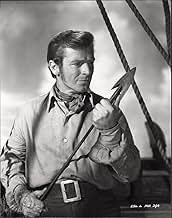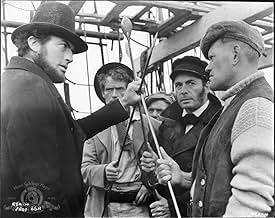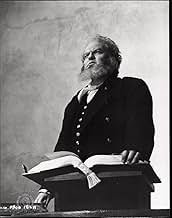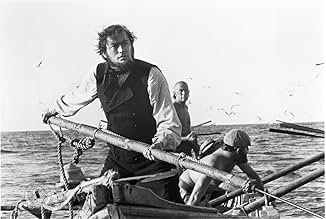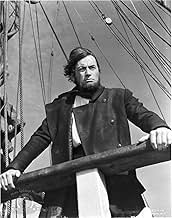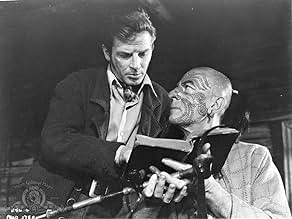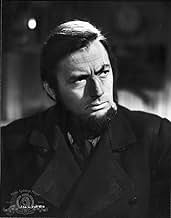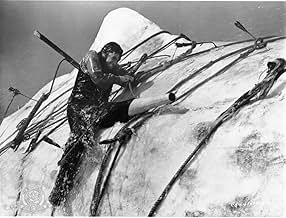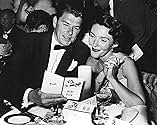CALIFICACIÓN DE IMDb
7.3/10
23 k
TU CALIFICACIÓN
El único superviviente de un barco ballenero perdido relata la historia de la obsesión autodestructiva de su capitán por cazar a la ballena blanca, Moby Dick.El único superviviente de un barco ballenero perdido relata la historia de la obsesión autodestructiva de su capitán por cazar a la ballena blanca, Moby Dick.El único superviviente de un barco ballenero perdido relata la historia de la obsesión autodestructiva de su capitán por cazar a la ballena blanca, Moby Dick.
- Dirección
- Guionistas
- Elenco
- Premios
- 5 premios ganados y 4 nominaciones en total
Friedrich von Ledebur
- Queequeg
- (as Friedrich Ledebur)
Tamba Allen
- Pip
- (sin créditos)
Opiniones destacadas
Some critics panned this pic when it came out - Peck too wooden, the script too cliched, etc, etc. Don't believe a word of it. I saw this one when I was 8 or 9, and for years I watched it every time it came on TV - even in B&W! Peck isn't wooden, he's intense and fascinating (my favorite scene: in his cabin, saying to Starbuck, "That bed is a coffin"). The language may sound stilted, but it's MELVILLE'S, and the cast sink into it with conviction.
Some critic (I don't know which) has said that Moby Dick (the book) is an "uncomfortable masterpiece" - or something like that - meaning that it's a hard pill to swallow. The movie is bound to be a hard pill for many viewers as well. But that's their loss. Huston's movie is a great big powerful thing - you believe in Peck's crazy passion, in Starbuck's gentleness, in Ishmael and Quequeg's bond, in the evil of the whale, even.
Another favorite sequence: the Pequot becalmed, the crew lying about under the intense sun, slowly going crazy. The climactic chase is superb and thrilling, of course; what it all adds up to is a film about the elements, and our relationship to them. The whale is just the biggest of a whole slew that constantly threaten to destroy us. Nature, our natures - all the things we fight against with our intelligence, that threaten to engulf us.
Beautiful film, one of Huston's best. I find the analogy with Hitler/Nazis in an earlier comment very interesting. Another would be with an earlier Huston film, The Treasure of the Sierra Madre - another film about people taking terrible chances for reasons that don't stand up to a lot of examination, whose biggest obstacle turns out to be themselves. By the way, will someone please rerelease Moby Dick in a restored version so we can get a really good look at all that glorious Technicolor?
Some critic (I don't know which) has said that Moby Dick (the book) is an "uncomfortable masterpiece" - or something like that - meaning that it's a hard pill to swallow. The movie is bound to be a hard pill for many viewers as well. But that's their loss. Huston's movie is a great big powerful thing - you believe in Peck's crazy passion, in Starbuck's gentleness, in Ishmael and Quequeg's bond, in the evil of the whale, even.
Another favorite sequence: the Pequot becalmed, the crew lying about under the intense sun, slowly going crazy. The climactic chase is superb and thrilling, of course; what it all adds up to is a film about the elements, and our relationship to them. The whale is just the biggest of a whole slew that constantly threaten to destroy us. Nature, our natures - all the things we fight against with our intelligence, that threaten to engulf us.
Beautiful film, one of Huston's best. I find the analogy with Hitler/Nazis in an earlier comment very interesting. Another would be with an earlier Huston film, The Treasure of the Sierra Madre - another film about people taking terrible chances for reasons that don't stand up to a lot of examination, whose biggest obstacle turns out to be themselves. By the way, will someone please rerelease Moby Dick in a restored version so we can get a really good look at all that glorious Technicolor?
It would be impossible to make a movie that came up to the standard of the novel "Moby-Dick", but this film does a fine job of capturing some of the most important themes, and of telling a selection of the key parts of the story in an interesting way. It would be a temptation for any film-maker to put the focus on the action and the special effects, and thus ruin the heart of the book by downplaying its themes, as so many recent films have done with other classic material. Instead, John Huston's version concentrates on bringing out many of the complex internal and external conflicts of Captain Ahab, in sketching the crew members and their reactions to Ahab's monomania, and in portraying the atmosphere of frequent tedium, growing tension, and occasional dread aboard the 'Pequod'.
Richard Basehart's mild, pleasant demeanor makes Ishmael an appropriate mirror for the events and characters on the ship. Gregory Peck does rather well in the very challenging role of Ahab. Ahab is one of the most carefully-designed and demanding characters in literature, and lesser actors would simply be an embarrassment in the part. On screen, there is much to Ahab that just does not come across, and Peck's performance has to be judged with that in mind.
Leo Genn makes his scenes as Starbuck count, and several of the other crew members are portrayed well, albeit in much smaller parts. As Father Mapple, Orson Welles has only one scene, but it is an important one, in that it sets up some of the vital themes of the story ahead. Welles was an ideal choice, and his scene in the church is one scene that does come up to the high standard of Melville's novel.
While there may indeed be some areas in which this version falls short, and it's fair to point them out, it would be pretty difficult to improve on it in a cinema version of the story. And if taken on its own, it fits together well, making generally good choices as to what material would fit together and would work on screen, and in using the photography and settings to create the right atmosphere. For those who appreciate the depth of the original story, this has more than enough to make it worth watching.
Richard Basehart's mild, pleasant demeanor makes Ishmael an appropriate mirror for the events and characters on the ship. Gregory Peck does rather well in the very challenging role of Ahab. Ahab is one of the most carefully-designed and demanding characters in literature, and lesser actors would simply be an embarrassment in the part. On screen, there is much to Ahab that just does not come across, and Peck's performance has to be judged with that in mind.
Leo Genn makes his scenes as Starbuck count, and several of the other crew members are portrayed well, albeit in much smaller parts. As Father Mapple, Orson Welles has only one scene, but it is an important one, in that it sets up some of the vital themes of the story ahead. Welles was an ideal choice, and his scene in the church is one scene that does come up to the high standard of Melville's novel.
While there may indeed be some areas in which this version falls short, and it's fair to point them out, it would be pretty difficult to improve on it in a cinema version of the story. And if taken on its own, it fits together well, making generally good choices as to what material would fit together and would work on screen, and in using the photography and settings to create the right atmosphere. For those who appreciate the depth of the original story, this has more than enough to make it worth watching.
This is a film that becomes part of you. I used to watch it over and over again on TV when it was shown during my childhood in the 1960's, and I never tire of watching it. And whenever I find myself living somewhere away from the ocean, the longing is intense to find water again. "Call me Ishmael".
The screenplay was written by Ray Bradbury, and it was his first. In his lectures and interviews, Bradbury always seems to tell the story of how John Huston contacted him out of the blue for this assignment. Evidently, he flew Bradbury and his wife to Ireland, where the science fiction writer was holed up in a hotel for a few weeks, in a wonderful agony of creation.
Bradbury has always been enamoured with classic novels. His book "Fahrenheit 451" told us how great literature somehow becomes subversive, in a controlled society. Under fascism, individuals are not encouraged to understand what it is to be truly human. Life becomes flat, and it is a deliberate process.
Before I had a VCR, I taped this movie on an audio cassette. It was an amazing experience to see it unfold in my mind's eye.
Bradbury put his whole heart into this screenplay, and the result can never be matched.
The screenplay was written by Ray Bradbury, and it was his first. In his lectures and interviews, Bradbury always seems to tell the story of how John Huston contacted him out of the blue for this assignment. Evidently, he flew Bradbury and his wife to Ireland, where the science fiction writer was holed up in a hotel for a few weeks, in a wonderful agony of creation.
Bradbury has always been enamoured with classic novels. His book "Fahrenheit 451" told us how great literature somehow becomes subversive, in a controlled society. Under fascism, individuals are not encouraged to understand what it is to be truly human. Life becomes flat, and it is a deliberate process.
Before I had a VCR, I taped this movie on an audio cassette. It was an amazing experience to see it unfold in my mind's eye.
Bradbury put his whole heart into this screenplay, and the result can never be matched.
When John Huston was casting for Moby Dick he got to make it on condition that he get a name actor to play Ahab. He went to Gregory Peck who was surprised by the offer. Given his image and the roles he had played up to that time, Peck thought he'd be better cast as Starbuck the first mate. Nevertheless he agreed to do Ahab.
Peck got mixed reviews at the time, but over the course of 50 years his performance has gotten better with time. The film itself which was shot in Ireland and Wales has also aged well. It's a nice depiction of life on a whaling ship in the 1840s and the crew of the Pequod are nicely cast in their roles.
Orson Welles was set to do his own adaption of Moby Dick and canceled his film when he heard his friend John Huston was doing Moby Dick. Welles asked about doing Ahab, but was given the small role of Father Mapple, the minister who blesses the Pequod's voyage. In fact Huston gave Welles a free hand to do the scene as he saw fit and the results are gratifying.
Of course Herman Melville's novel is about obsession and vengeance. I've always thought the point of Moby Dick is that the evil white whale who Ahab so personalizes and demonizes is just a whale doing his whale thing trying to stay alive. It is in fact the whalers who hunt him and his kind. And Ahab losing his leg is what we would call an occupational accident. The evil is how Ahab seduces the whole crew into his own madness, even first mate Starbuck, played winningly by Leo Genn who is the voice of reason and civilization.
Other cast members to note are Harry Andrews as second mate Stub, Friedrich Ledebuhr as Queequeg the Pacific Islander harpooner, and of course Richard Basehart as Ishmael who tells the tale.
Peck got mixed reviews at the time, but over the course of 50 years his performance has gotten better with time. The film itself which was shot in Ireland and Wales has also aged well. It's a nice depiction of life on a whaling ship in the 1840s and the crew of the Pequod are nicely cast in their roles.
Orson Welles was set to do his own adaption of Moby Dick and canceled his film when he heard his friend John Huston was doing Moby Dick. Welles asked about doing Ahab, but was given the small role of Father Mapple, the minister who blesses the Pequod's voyage. In fact Huston gave Welles a free hand to do the scene as he saw fit and the results are gratifying.
Of course Herman Melville's novel is about obsession and vengeance. I've always thought the point of Moby Dick is that the evil white whale who Ahab so personalizes and demonizes is just a whale doing his whale thing trying to stay alive. It is in fact the whalers who hunt him and his kind. And Ahab losing his leg is what we would call an occupational accident. The evil is how Ahab seduces the whole crew into his own madness, even first mate Starbuck, played winningly by Leo Genn who is the voice of reason and civilization.
Other cast members to note are Harry Andrews as second mate Stub, Friedrich Ledebuhr as Queequeg the Pacific Islander harpooner, and of course Richard Basehart as Ishmael who tells the tale.
For those folks that want great literature without having to read a 500-page tome, then this Readers Digest like condensation might be the ticket. All the high points of Moby Dick are touched on starting with 'Call me Ishmael," and so on.
As all have already pointed out, Gregory Peck has nailed the Ahab character. You got me how he managed the whalebone peg leg. The obsessive rush to take vengeance on the great whale boils in crazed Ahab's head and certainly his crew one by one catch the fever for either greed or blind allegiance. Therefore, our allegorical story full of biblical references mete out large portions of philosophical sophisms, enough for the entire Humanities Departments at fifty Universities to burn the midnight whale oil; oh, the reams of paper written about poor Moby, we're talking deforestation here.
If ever there was a story to get young men to read Lit, Moby Dick is the one.
As all have already pointed out, Gregory Peck has nailed the Ahab character. You got me how he managed the whalebone peg leg. The obsessive rush to take vengeance on the great whale boils in crazed Ahab's head and certainly his crew one by one catch the fever for either greed or blind allegiance. Therefore, our allegorical story full of biblical references mete out large portions of philosophical sophisms, enough for the entire Humanities Departments at fifty Universities to burn the midnight whale oil; oh, the reams of paper written about poor Moby, we're talking deforestation here.
If ever there was a story to get young men to read Lit, Moby Dick is the one.
¿Sabías que…?
- TriviaGregory Peck initially blamed the poor reviews of his performance on the script, which he felt contained "too much prose from the novel". However, he later acknowledged that he had been too young for the part at 38, since Captain Ahab was supposed to be an old man at the end of his career (Ahab's age, as implied in the book's chapter "The Symphony", is 58). He added, "The film required more. At the time, I didn't have more in me." and apologized to the screenwriters. Director John Huston admitted he didn't want Peck as Ahab, but had spoken very highly of him & was very satisfied with his performance.
- ErroresThe way the ship was moved away from the pier was incorrect. The crew is shown hauling a line from the pier. This would not make the ship move forward. To move a ship out of the harbor, it is therefore, necessary to provide something to pull against. A special anchor, called a kedging anchor, is carried as far from the ship as possible by the longboat and then dropped to the seabed. The remaining crew pull the ship out to it winding the line around the capstan or winch, and then it is hauled up and the process repeated as many times as necessary.
- Citas
Captain Ahab: From hell's heart I stab at thee; for hate's sake I spit my last breath at thee. Ye damned whale.
- Créditos curiososThe film finishes with 'Finis' instead of the usual 'The End'.
- ConexionesEdited into De 7 Dødssyndene: Latskap (2007)
Selecciones populares
Inicia sesión para calificar y agrega a la lista de videos para obtener recomendaciones personalizadas
Detalles
- Fecha de lanzamiento
- País de origen
- Idioma
- También se conoce como
- Herman Melville's Moby Dick
- Locaciones de filmación
- Youghal, County Cork, Irlanda(harbour: New Bedford - departure of The Pequod)
- Productora
- Ver más créditos de la compañía en IMDbPro
Taquilla
- Presupuesto
- USD 4,500,000 (estimado)
- Total a nivel mundial
- USD 353
- Tiempo de ejecución1 hora 56 minutos
- Relación de aspecto
- 1.66 : 1
Contribuir a esta página
Sugiere una edición o agrega el contenido que falta


